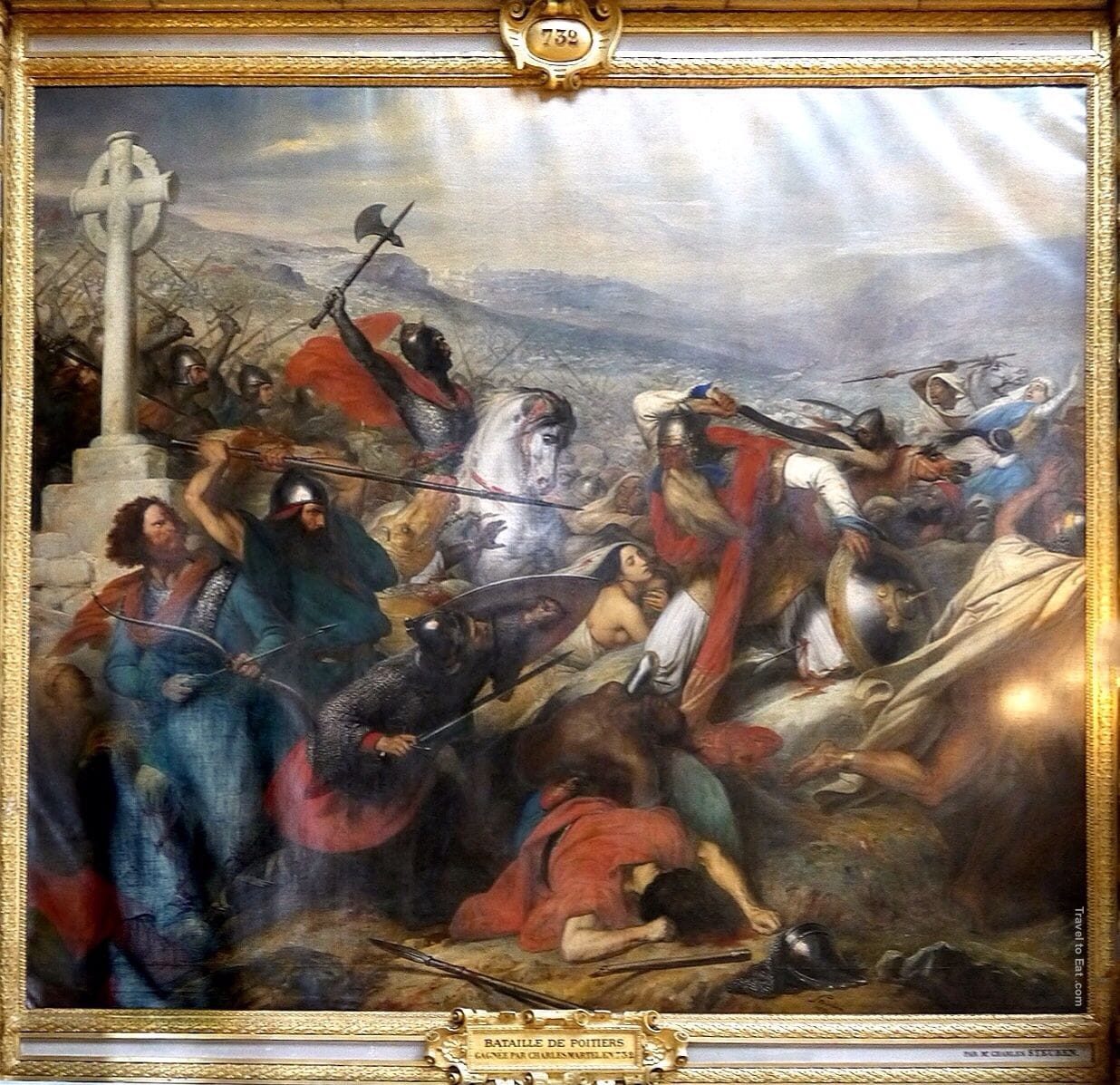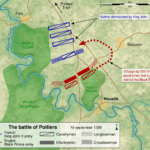Once upon a time in 732 AD, there was a huge battle in France that changed the course of European history. The Franks, led by Charles Martel, fought against the Umayyads, led by a guy named Abd al-Rahman. This battle was so important that it determined whether Europe would be a Christian or a Muslim continent.
The Battle of the Tours: A Clash of Civilizations and Beliefs
Imagine a time when two different worlds collided, each driven by a thirst for conquest and a clash of beliefs. This was the setting of the Battle of the Tours, a pivotal event that shaped the destiny of Europe.
On one side, the Umayyad Empire, a powerful Muslim force, had conquered vast territories, their sights now set on Gaul, the heartland of the Frankish kingdom. Led by the skilled general Al Ghafiqi, they marched into France, their ambitions fueled by visions of conquest.
On the opposing side, Charles Martel, the leader of the Franks, stood as a fierce defender of his people and their Christian faith. A master of military strategy, he gathered his forces to confront the invading horde.
On the fateful day of October 10, 732 AD, the two armies clashed near Tours. For seven bloody days, they fought tooth and nail, with the Franks holding their ground against wave after wave of Muslim attacks. Martel’s heavy infantry proved a formidable force, repelling the cavalry charges of the Muslims.
As the battle reached its peak, chaos erupted within the Muslim ranks. Rumors spread of Al Ghafiqi’s death, causing panic and disorder. Sensing their advantage, Martel’s Franks surged forward, inflicting heavy losses on the enemy.
Victory belonged to the Franks. The Battle of Tours had ended the Muslim advance into Europe, cementing Martel’s legacy as the “Hammer of the Saracens.”
This battle was not merely a military triumph; it had far-reaching consequences for the future of Europe:
- It preserved Christianity as the dominant religion in the West, preventing its replacement by Islam.
- It solidified the power of the Franks, paving the way for the rise of the Carolingian Empire.
- It influenced the development of European art, architecture, and the growth of Christian monasteries.
The Battle of Tours remains a poignant reminder of the clash of civilizations and the enduring power of courage, determination, and the unwavering belief in one’s cause.
Learn more about the pivotal Battle of Poitiers and the legendary Charles Martels who led the Franks to victory. Delve into the historical significance of Tours 732 and discover what the Battle of Tours truly meant for the course of European history.
When and where did the Battle of Tours take place?
Imagine you’re back in time, on the edge of your seat, witnessing one of the most pivotal battles in history that changed the course of Europe forever. The Battle of Tours, an epic clash between two mighty armies, took place on October 10th, 732. Let’s dive into the details of this iconic battle and its significance.
The Battleground
The battleground was located between Tours and Poitiers in present-day France. The scene was set for a fierce struggle between the Frankish and Aquitanian armies led by the legendary Charles Martel, known for his incredible military prowess, and the mighty Muslim Umayyad Caliphate army led by Abd al-Rahman al-Ghafiqi.
The Battle
As the two armies faced off on the open field, the clash was inevitable. The Frankish and Aquitanian forces, skillfully organized by Charles Martel, fought valiantly, determined to defend their territory from the invading Muslim army. The Muslim forces, known for their formidable cavalry charges, were equally determined to conquer and expand their empire.
The battle raged fiercely for hours, with neither side gaining a clear advantage. The tide of battle shifted when Charles Martel’s cavalry launched a devastating attack that broke through the Muslim lines. The Muslim forces, facing a relentless onslaught, were forced to retreat, marking a decisive victory for the Franks and Aquitanians.
The Aftermath
The Battle of Tours had far-reaching consequences. The Frankish victory prevented the Umayyads from establishing a permanent foothold in Frankish territory. It’s believed that if the Muslims had been victorious, they could have potentially conquered all of Western Europe, forever altering the course of history.
This momentous battle cemented Charles Martel’s reputation as one of the greatest military commanders of his time. It also laid the foundation for the Carolingian Empire, which would later become the Holy Roman Empire. The Battle of Tours stands as a testament to the courage and resilience of the Frankish and Aquitanian forces, who played a pivotal role in shaping the destiny of Europe.
Who were the key figures involved in the Battle of Tours?
Picture this: a fierce clash on the battlefields of early Europe, where the fate of nations hung in the balance. Let’s meet the masterminds who played a decisive role in this pivotal encounter.
Charles Martel: The Frankish Mastermind
Imagine the scene: Charles Martel, a charismatic Frankish leader, his piercing gaze fixed on the battlefield. His cunning war strategies and unwavering resolve made him a force to be reckoned with, earning him the title “Hammer.” Under his command, the Franks stood ready to defend their faith and their land.
Abdul Rahman Al Ghafiqi: The Muslim General
On the other side of the battlefield, Abdul Rahman Al Ghafiqi, a seasoned Muslim general, led his troops with a burning determination. His tactical brilliance and strategic maneuvers shaped the course of the battle, leaving an indelible mark on history.
Behind the Scenes: Unsung Heroes
While these two commanders stole the limelight, let’s not forget the unsung heroes who also played a part in the drama.
| Name | Role |
|---|---|
| Odo the Great | Duke of Aquitaine, provided crucial reinforcements to the Franks |
| Eudes | Duke of Toulouse, fought valiantly alongside the Franks |
| Ashina Hsieh | Muslim general, led a flank attack against the Franks |
Legacy of the Battle
The Battle of Tours was a game-changer, folks. Its outcome rocked the medieval world and shaped the destiny of Europe. Picture this: the Muslims halted their advance, preserving the Christian heritage of Western Europe. And it was all thanks to the brilliant minds and fearless warriors who stood their ground on that fateful day.
How did the Battle of Tours impact the course of European history?
Picture this: the year is 732 AD. Europe is a patchwork of kingdoms and duchies, each with its own ambitions and beliefs. But one threat looms large: the Umayyad Caliphate, a powerful Muslim empire that has swept across North Africa and Spain.
At the forefront of the defense against this invasion are the Franks, a Germanic people led by the brilliant general Charles Martel. And it all comes to a head at the Battle of Tours, a showdown that would change the fate of Europe forever.
Why was the Battle of Tours so Important?
Just think about it. If the Muslims had won, Europe could have become a very different place. Islam might have spread far beyond Spain, possibly even dominating all of Western Europe. But thankfully, that didn’t happen.
What Happened in the Battle of Tours?
Well, it was a bloody day. Both sides fought with fierce determination, but in the end, the Franks emerged victorious. Charles Martel’s cavalry charge broke through the Muslim lines, and Abd al-Rahman al-Ghafiqi, the Muslim general, was killed.
What were the Consequences of the Battle of Tours?
Let’s break it down:
- Saved Europe from Muslim Rule: The victory preserved Western Europe as a Christian stronghold, halting the Muslim advance and ensuring that most of Europe would remain under Christian influence.
- Boosted Charles Martel’s Power: The triumph solidified Martel’s authority, paving the way for the rise of the Carolingian Empire, which would eventually dominate Western Europe.
- Reshaped European Politics: The battle prevented the Umayyads from gaining a foothold in the heart of Europe, altering the political landscape and shaping the power dynamics of the continent.
- Influenced European Culture: Preserving Western Europe as a Christian society fostered the growth of Western civilization, with its distinctive art, architecture, and intellectual traditions.
Conclusion:
The Battle of Tours was a momentous clash that shaped the destiny of Europe. It was a battle that not only preserved Christianity in the West but also set the stage for the emergence of a new European order. Its legacy can still be seen today, in the cultural and religious tapestry that makes up Europe’s unique heritage.
FAQ
Q1: What was the Battle of Tours?
A1: The Battle of Tours was a pivotal military engagement that took place in 732 AD between the invading Muslim forces of the Umayyad Caliphate and the Frankish forces led by Charles Martel. The battle’s outcome halted the Muslim advance into Western Europe and preserved the region as a Christian stronghold.
Q2: When and where did the Battle of Tours take place?
A2: The Battle of Tours was fought on October 10, 732 AD, somewhere between the cities of Tours and Poitiers in what is now France. The exact location of the battlefield remains uncertain.
Q3: Who were the key figures involved in the Battle of Tours?
A3: The key figures involved in the Battle of Tours were Charles Martel, the leader of the Frankish forces, and Emir Abdul Rahman Al Ghafiqi, the commander of the Muslim army. Charles Martel’s victory at Tours solidified his authority within the Frankish kingdom and earned him the title “Savior of Christendom.”
Q4: How did the Battle of Tours impact the course of European history?
A4: The Battle of Tours had a profound impact on the course of European history. It halted the Muslim expansion into Western Europe and preserved the region’s Christian heritage. The battle also marked a turning point in the balance of power between the Christian and Muslim worlds.
Q5: What are the enduring legacies of the Battle of Tours?
A5: The Battle of Tours has left several enduring legacies. It remains a significant event in the history of warfare, studied by military historians for its tactical and strategic implications. The battle also played a crucial role in shaping the political and cultural landscape of Europe, contributing to the development of a distinct Western European identity.
- Mastering Leader in Spanish: The Complete Guide - April 19, 2025
- Uncovering Surprising Parallels: England Size Compared to US States - April 19, 2025
- Old Mexico Map: Border Shifts 1821-1857 - April 19, 2025

















Comments are closed.